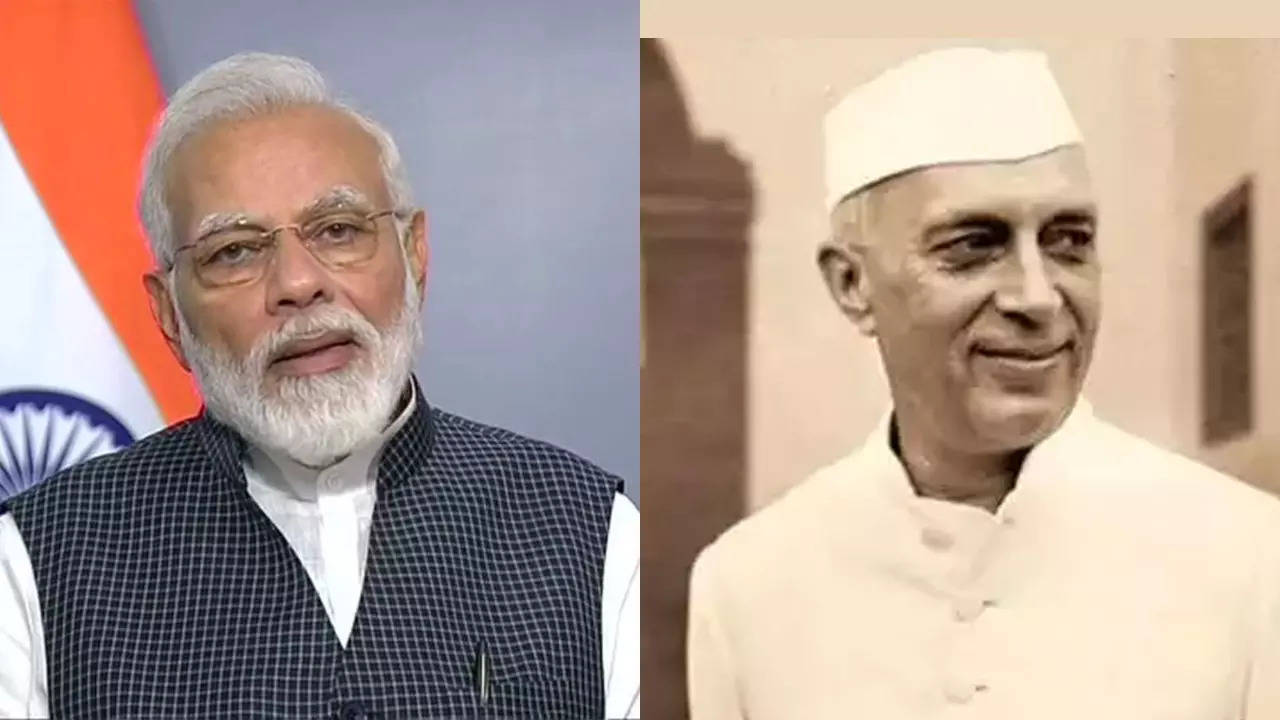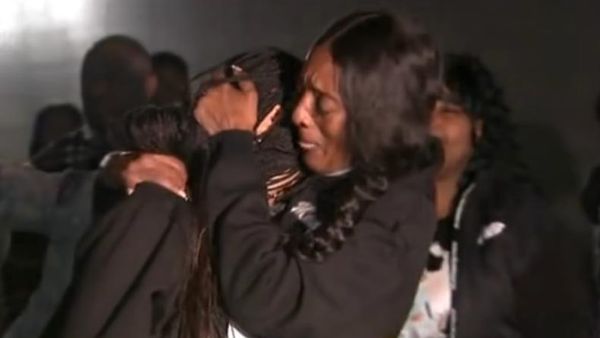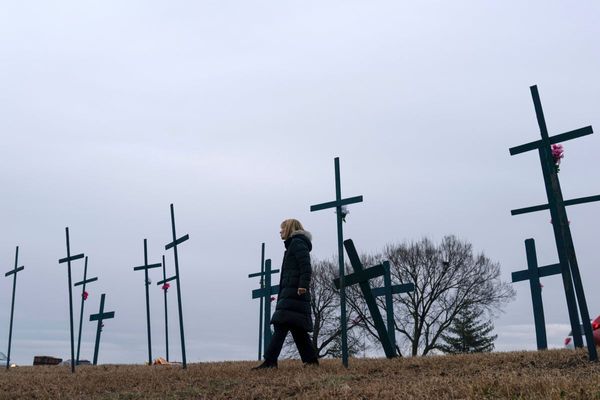
NEW DELHI: The BJP and the Congress have clashed head-on over Prime Minister Narendra Modi’s remarks on India’s first PM Jawaharlal Nehru’s role in Jammu and Kashmir. While the BJP has defended first home minister Sardar Vallabhbhai Patel, the Congress has come to the rescue of Nehru.
While praising Patel’s role in unifying the country after independence, Modi blamed Nehru for the problems in Jammu and Kashmir.
On the other hand, the Congress defended Nehru. However, while doing so, it presented a critique of Patel and Maharaja Hari Singh, the then ruler of Kashmir.
The BJP hit back and said Patel was in favour of a full-fledged war with Pakistan to settle the Kashmir dispute but it was Nehru who prevented the home minister from executing his plan.
Modi praises Sardar Patel, attacks Nehru
The argument between the Congress and the BJP started after Modi's remarks made in a rally in Anand district of Gujarat on October 10.
Addressing a BJP rally ahead of the assembly election in his home state, the prime minister credited Patel with resolving issues of merger of other princely states. However, without naming Nehru, he blamed "one person" who could not resolve the Kashmir issue.
The PM said he was walking in the footsteps of Sardar Patel and, therefore, he was able to resolve the long-pending Kashmir issue.
Modi said, "Sardar saheb persuaded all the princely states to merge with India. But another person handled this one issue of Kashmir… As I am following in the footsteps of Sardar saheb, I have values of the land of Sardar and that was the reason I resolved the problem of Kashmir and paid true tributes to Sardar Patel."
Modi said if BJP workers got to talk to Congressmen, they should ask them whether they ever visited the world's tallest Statue of Unity constructed in the honour of Sardar Patel. "It's been several decades since Sardar saheb passed away. Now show some generosity and bow before Sardar saheb's feet. They would not do so...," he said.
Terming the Statue of Unity at Ekta Nagar (Kevadia) in Gujarat as the “pride of the world”, the PM said even when it was an opposition party, the BJP had resolved to ensure that Sardar Patel got his due. “Today, the people of Gujarat have worked to honour Sardar saheb, and the BJP is proud of it," he said.
Congress objects to Modi’s remarks
The Congress took affront to Modi’s attack on Nehru’s role in Kashmir.
In a series of tweets, Congress general secretary in-charge of communications Jairam Ramesh accused the prime minister of twisting facts. He said, “The PM has once again whitewashed real history. He overlooks the following facts only to castigate Nehru on J&K. All this has been documented well in Rajmohan Gandhi's biography of Sardar Patel. These facts are also known to the PM's new man in J&K.”
The Rajya Sabha MP noted three points to buttress his argument. “1. Maharaja Hari Singh dithered on accession. There were dreams of independence. But when Pakistan invaded, Hari Singh acceded to India. 2. Sheikh Abdullah championed accession to India entirely because of his friendship with and admiration for Nehru, and his respect for Gandhi. 3. Sardar Patel was okay with J&K joining Pakistan till Sept 13, 1947 when the Nawab of Junagadh acceded to Pakistan,” he said.
Ramesh posted extracts from the book ‘Patel: A Life’ by Rajmohan Gandhi which said, “Vallabhbhai's lukewarmness about Kashmir had lasted until September 13, 1947. That morning, in a letter to Baldev Singh, he had indicated that ‘if [Kashmir] decides to join the other Dominion’, he would accept the fact. His attitude changed later that day when he heard that Pakistan had accepted Junagadh's accession. If Jinnah could take hold of a Hindu majority State with a Muslim ruler, why should the Sardar not be interested in a Muslim majority State with a Hindu ruler.
“From that day Junagadh and Kashmir, the pawn and the Queen, became his simultaneous concerns. He would wrest the one and defend the other. He would also defend Hyderabad, to him the King on the chessboard. Had Jinnah allowed the King and the pawn to go to India, Patel, as we have seen, might have let the Queen go to Pakistan, but Jinnah rejected the deal,” the book said.
BJP counters Congress
In a salvo fired at the Congress, the BJP quoted several sources to prove Nehru’s fault on Kashmir.
BJP leader co-in-charge of West Bengal Amit Malviya too posted a series of tweets in response to Jairam Ramesh. He said, “Sardar Vallabhbhai Patel had some of his deepest and most contentious differences with Jawahar Lal Nehru on the topic of Kashmir. He resented Nehru’s constant interference in matters related to Kashmir and its security which were issues under Patel’s domain.
Malviya cited a paragraph from ‘The Collected Works of Sardar Vallabhbhai Patel’ which said, “Though the president [Nehru] has been elected for the fourth he often acts with childlike innocence, which puts us all in difficulties. We are passing through a critical period and our life's work may either yield successful results or our hopes may all be dashed to pieces by sheer foolishness on our part [...] He has done many things recently which have caused us great embarrassment, His action in Kashmir, his interference in the Sikh election to the Constituent Assembly, his press conference immediately after the AICC are all acts of emotional insanity and it puts tremendous strain on us to set matters right.”
He said, “It was Patel who took charge of the situation and ordered the Indian Army into Kashmir to defend it from Pakistani attack in 1947. Sheikh Abdullah’s aide Bakshi Ghulam Mohammed noted that in the meeting where the attack was being discussed, Nehru only displayed anxiety… and helplessness. It was Sardar Patel who took charge and told the Indian generals that ‘Kashmir must be defended at all costs’.”
Malviya, in-charge of BJP’s information and technology department, said Patel and Nehru came to the point of resigning from the government over their differences on Kashmir.
He said, “Patel was in favour of settling the Kashmir dispute in a full-fledged war with Pakistan once and for all, but Nehru prevented this. Air Marshal Thomas Elmhirst, chairman of the chief-of-staff committee at that time noted that Patel told him, ‘If all the decisions rested on me, I think I would be in favour of extending this little affair in Kashmir to full scale war with Pakistan… let us get it over once and for all, and settle down as a united continent’.”
Malviya finally said, “General S P P Thorat also wrote in his book that when the 1947-48 war happened, ‘Our forces might have succeeded in evicting the invaders, if the Prime Minister had not held them in check and later ordered the ceasefire’.”
Pakistan condemns Modi’s comments
Meanwhile, Pakistan has also condemned Prime Minister Modi’s remarks over Kashmir. According to reports, its foreign office said in a statement, “Instead of making delusional statements about having resolved the dispute unilaterally, the Indian leadership must deliver on their commitments to the Kashmiris and to the world and ensure that the people of Kashmir are accorded their inalienable right to self-determination.”







